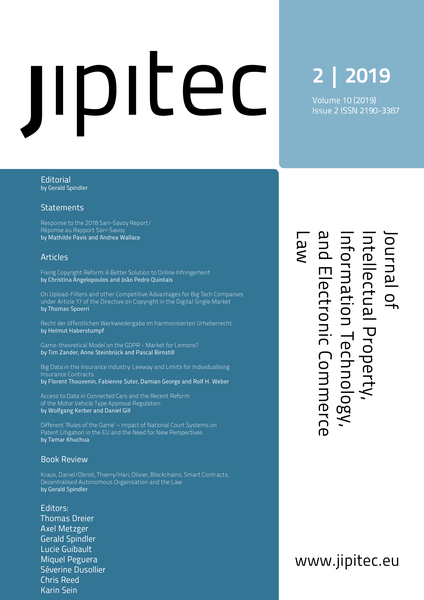On Upload-Filters and other Competitive Advantages for Big Tech Companies under Article 17 of the Directive on Copyright in the Digital Single Market
Keywords:
Article 17, Copyright, Directive (EU) 2019/790, Directive on Copyright in the Digital Single Market, EU Copyright, Filtering Obligations, Proactive monitoring obligations, Upload-Filters, Value GapAbstract
Article 17 of the Directive on Copyright in the Digital Single Market (DSM), with its goal to close the so-called “value-gap”, contains several strong incentives to use and further develop filtering technologies. It also introduces a direct liability regime, which puts content-service sharing providers (CSSPs) at risk if they do not successfully implement upload-filters as it is only in exceptional situations that CSSPs will not be required to use these filters. Thus, article 17 DSM leads to a situation where nearly any company offering content-sharing services will be required to implement filtering tools in order to avoid the DSM’s direct liability regime. Having access to a strong upload-filter is therefore essential for CSSPs to be able to remain competitive in the new DSM era. However, only big tech companies have the financial power, technological knowledge and internal structure necessary to develop their own competitive upload-filter, which thus gives them an advantage over small and mid-sized CSSPs, as they most likely won’t have the means to develop their own upload-filter. While these smaller CSSPs will have the option to license the required filters from third-party providers like Audible Magic, they may not all be able to afford such provider’s services. In any event, there is a risk that small and mid-sized CSSPs will not have access to upload-filters. However, due to the technological limitations of upload-filters, even the most sophisticated filtering tools will most likely lead to an important number of false positives, which, in turn, will cause the over-blocking of a substantial amount of non-infringing content in the EU. These false positives will have to be reviewed by humans, since maintaining an effective and expeditious complaint and redress mechanism is required by article 17(9) DSM. The requirements of having an efficient upload-filter as well as human review of false positive cases will have an adverse financial impact on the big tech companies, but it is the small and mid-sized CSSPs that will most feel the blow. As a result, a likely unintended consequence of article 17 DSM is that it indirectly provides the big tech companies a competitive advantage over smaller CSSPs, who may end up being pushed out of, or prevented from entering, the market due to their inability to meet article 17 DSM´s requirements. This competitive advantage for big tech companies is a negative side-effect that will hurt competition and may lead to a greater market concentration in the EU amongst CSSPs. This appears to be a very expensive price to pay in the attempt to close the value gap.Published
2019-08-10
Issue
Section
Artikel

